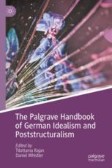Search
Search Results
-
Friedrich Wilhelm Joseph Schelling
In der gegenwärtigen Schellingforschung werden drei der Schriften F. W. J. Schellings hinsichtlich seines Verständnisses von Anerkennung ausgedeutet:...
-
F.W.J. Schelling
This chapter deals with the presence of Plotinus in the work and thought of Schelling (1775–1854). It discusses the evidence for Schelling’s...
-
Drives in Schelling: Drives as Cognitive Faculties
Quite remarkably, Friedrich Wilhelm Joseph Schelling uses the notion of “drive” (and related notions, such as “instinct”) in analysing important...
-
Deutscher Idealismus (VII): Friedrich Wilhelm Joseph Schelling
Die Ontologie nimmt bei Schelling eine besondere Stelle ein. Sein philosophisches Projekt lässt sich insgesamt geradezu als ›transzendentale...
-
Ravaisson After Schelling: Purposiveness Without Purpose in Genius and Habit
This study investigates Félix RavaissonRavaisson-Mollien, Félix’s ambiguous relation to F. W. J. Schelling by homing in on the specific relation that...
-
The Reception of German Philosophy in the Mind of Pierre-Joseph Proudhon
In opposition to MarxMarx, Karl’s polemical criticism of ProudhonProudhon, Pierre-Joseph’s abuse of Hegelian thought, this study shows—on the basis...
-
Hegel, Schelling and Günderrode on Nature
This chapter compares the philosophies of nature of Schelling, Hegel, and Günderrode. For Schelling, nature is organized by a dynamic opposition...
-
Redeeming German Idealism: Schelling and Rosenzweig
As is well known, the renowned Hegel scholar, Franz Rosenzweig, had a dramatic break with Hegel in particular and German Idealism more broadly, as...
-
Nietzsche, David Friedrich Strauß, and the Post-Straussian Tradition
Via the figure of the German poet Eduard Mörike, this chapter opens by reviewing the significance of the liberal Protestant theologian David...
-
The History of Philosophy as an ‘Organism’: The School of Schelling
The followers of Schelling, henceforth called Schellingians, undertook different approaches in their composition of general histories of philosophy....
-
Geistmetaphysik als logoszentrische Seinsvermittlung
DieGeistGeistmetaphysik FrageFrage desSeinsvermittlung Anfangs findet nicht nur eine traditionelle idealistische Lösung in der einfachen...
-
Chronology of Key Works
The present chapter enumerates in chronological order—fairly exhaustively—those francophone works which discussed the philosophies of Hegel and...
-
Landmarks
This chapter is intended to provide some introductory orientation concerning what the Hegelian and Schellingian reception in France looked like. It...
-
Schiller and the Birth of German Idealism
Friedrich Schiller’s significance for philosophy was established in an irrefutable way by the Neo-Kantians. Following Kuno Fischer’s brilliant...
-
Friedrich Wilhelm Joseph Schelling
Schopenhauer und Friedrich Wilhelm Joseph Schelling (1775–1854) waren, obwohl man Schopenhauer schon der nachidealistischen Philosophie im 19....
-
Negative, Positive, and Complementarity: Remarks on Schelling’s Absolute Idealism
Schelling’s late philosophy consists of two philosophical representations, i.e., his negative and his positive philosophy. Whereas his negative...
-
Reading Novalis and the Schlegels
In dialogue with the critiques of the modern world in Sylvia Wynter and Afrofuturism, this chapter offers a reading of Early German Romanticism as a...
-
Schiller and Early German Romantics (Kleist, Hölderlin, Goethe)
Schiller’s importance for the Romantic generation is discussed in relation to three writers and thinkers whose work arose in close connection—and by...
-
The Development of Schiller’s Philosophical Attitude: Schiller’s Philosophical Education
Schiller’s philosophical attitude developed early on and remained unswerving thereafter, being unaffected by either intellectual or personal events....
-
Systems of Knowledge
This chapter considers Idealism’s encyclopedic knowledge-systems as a “general economy” that deconstructs any panlogical unification of philosophy,...
